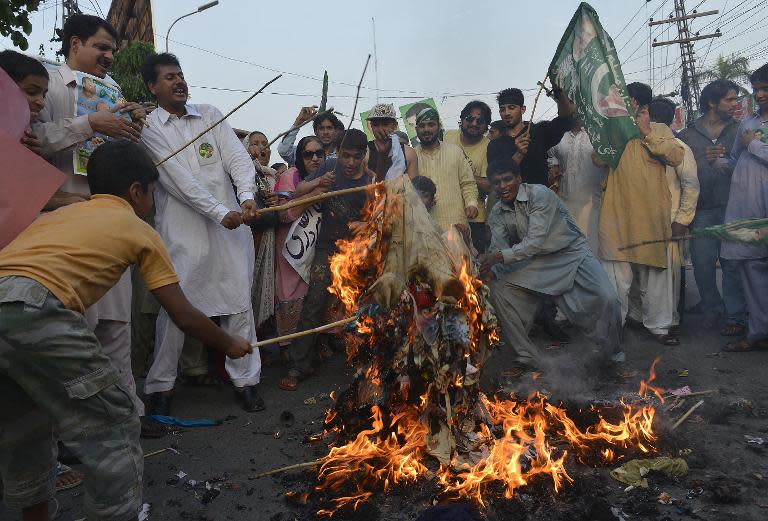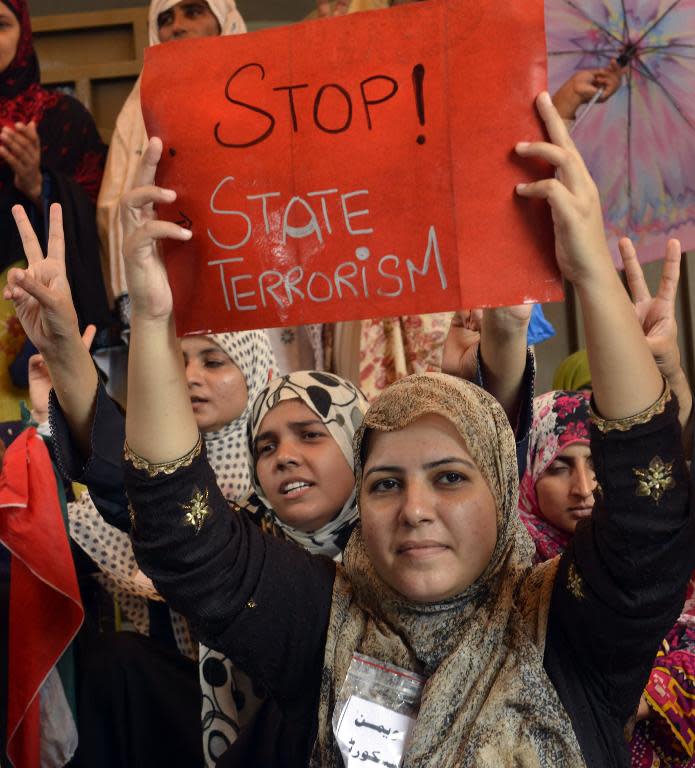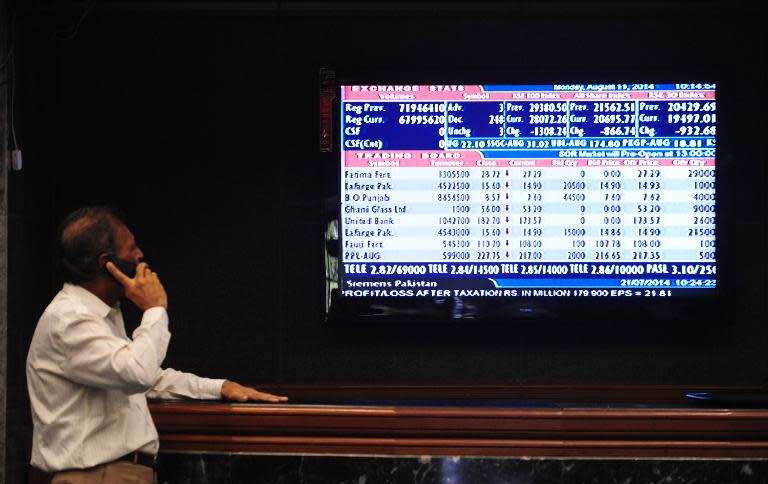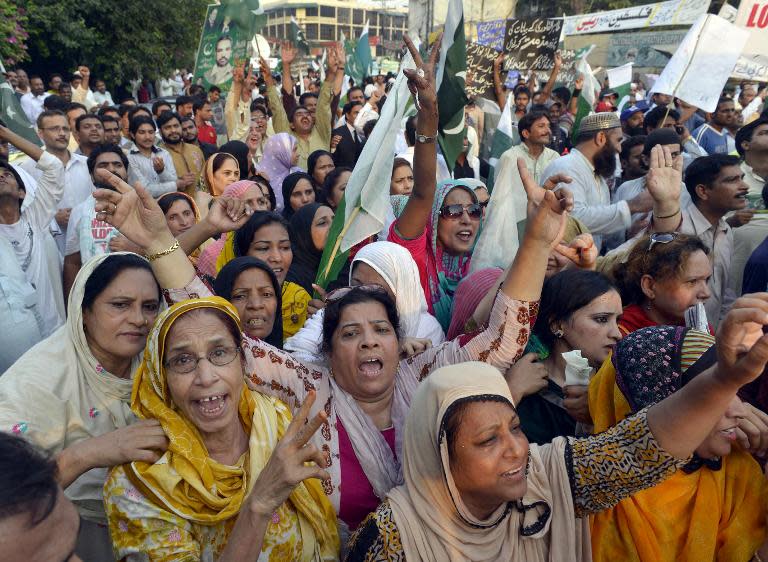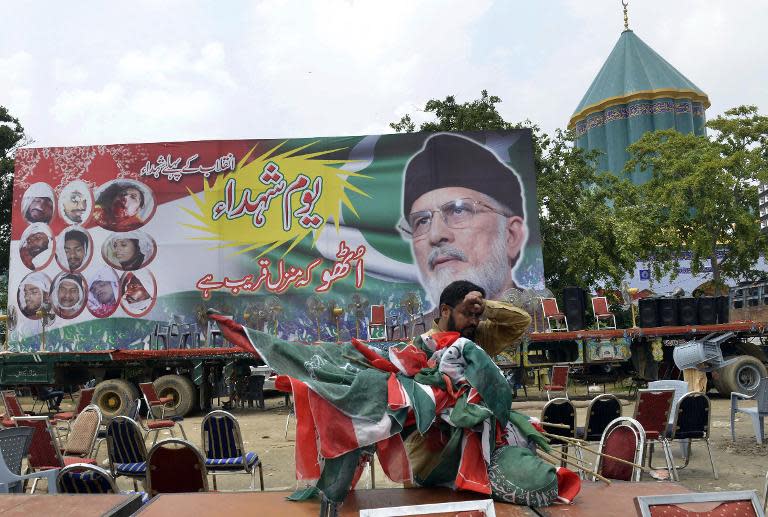Pakistan stocks drop as protest leader calls for unity government
Pakistani stocks plunged 4.5 percent on Monday over fears of a looming political crisis after opposition groups prepared to march on the capital vowing to topple the government. The protests are headed by charismatic cricket star turned opposition leader Imran Khan and Canada-based preacher Tahir-ul-Qadri, who told AFP on Monday his supporters are struggling for an "interim national government" consisting of technocrats and experts. Tension has gripped parts of the country since last week with running clashes between police and Qadri's supporters in the eastern city of Lahore over several days leaving at least one protester dead. In the capital Islamabad, authorities have been preparing to block roads using shipping containers while rumours of impending fuel shortages have sparked panic and long lines at petrol stations. Both Khan and Qadri allege that the 2013 elections, which saw Prime Minister Nawaz Sharif return to power in Pakistan's first handover of power from one civilian-led government to another, were rigged. But critics accuse the groups of being aided by the powerful military establishment in order to undermine the government whilst diverting attention from more pressing issues like an offensive against the Taliban in the northwest and the country's economy. The benchmark Karachi Stock Exchange closed down 1309 points to 28,071, reversing weeks of positive performances that saw it touch a 68-year high. "In the beginning investors believed that there might be some political reconciliation before the march takes off," said Mohammad Sohail, the head of Topline Securities in Karachi. "But after the call yesterday of Qadri, panic gripped the investors," he said. The marches are planned for August 14, the date of Pakistan's independence from Britain in 1947. The exchange lost some $3.05 billion in terms of market capitalisation -- the largest ever fall in its stock value in one day. - 'Technocrat government needed' - In a telephone interview with AFP from his home in Lahore, which is currently surrounded by police, Qadri accused authorities of running a campaign of misinformation after the government said his supporters were responsible for the death of a policeman and began a murder investigation into him. "I totally reject these allegations and declare them them wrong, false and baseless," he said. Qadri, who briefly returned to Pakistan last year before the poll to call for electoral reform, said his movement would campaign for a government of national unity before a fresh vote. "We would like the participation of all political parties but with the condition that only those people with good character, integrity and honesty with records free of corruption are invited. "Technocrats would be invited and some bureaucrats with very good records. "Specialists, including economists, lawyers, farmers, traders, industrialists, the labour class -- every segment of society should be represented," he added. The government for its part has rejected the allegations and accuses the opposition groups of attempting to obtain by force what they could not achieve through democracy. "These people should have participated in the election if they wanted to bring a revolution but the problem is they don't get more than fifty votes if they contest election(s)," Prime Minister Sharif said in Islamabad Monday. Ahsan Iqbal, the planning and development minister, added the 2013 polls were hailed as free and credible by local and international observers. "Nobody at the time raised objections over these arrangements. Around the world people don't wait 14 months before protesting rigging," he told AFP. He added that Khan in particular was worried about the government's economic performance -- which includes doubling foreign exchange reserves from $7 billion to $14 billion and stabilising the rupee at around 98 to the dollar after its high of 110. In July, ratings agency Moody's upgraded Pakistan's country outlook to 'stable' from 'negative' citing its improving external liquidity position and commitment to reforms. A senior government official who asked to remain anonymous added that both Khan and Qadri were "being coordinated" by a section of the Inter Services Intelligence agency as part of a plot by the army, which has been angered by the ongoing treason trial of former military ruler Pervez Musharraf. Both leaders have rejected the allegations.

